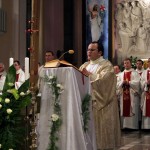The CNS video is astonishing:
At the end of a highly unusual spiritual retreat for the political leaders of warring factions, Pope Francis knelt at the feet of the leaders of South Sudan, begging them to give peace a chance and to be worthy “fathers of the nation.”
“As a brother, I ask you to remain in peace. I ask you from my heart, let’s go forward. There will be many problems, but do not be afraid,” he told the leaders, speaking without a text at the end of the meeting.
“You have begun a process, may it end well,” he said. “There will be disagreements among you, but may they take place ‘in the office’ while, in front of your people, you hold hands; in this way, you will be transformed from simple citizens to fathers of the nation.”
“The purpose of this retreat is for us to stand together before God and to discern his will,” he said in his formal remarks April 11, closing the two-day retreat in the Domus Sanctae Marthae, the Vatican guesthouse where he lives.
UPDATE: Some analysis and context by Andrea Tornielli:
It is a forceful image, which cannot be understood except in the climate of reciprocal forgiveness that characterized the two days of retreat. It was not a political or diplomatic summit, but an experience of prayer and common reflection among leaders who despite having signed a peace agreement, are struggling to ensure that it be respected.
Peace, for believers, is invoked in the presence of God. And it is invoked by praying even more in the face of the sacrifice of so many innocent victims of hatred and war. Something must have happened during those hours in Santa Marta, first of all between the leaders of South Sudan who accepted the invitation of the Bishop of Rome, whose title is “Servant of the Servants of God”. Kneeling with effort to kiss their feet, the Pope bowed down before that which God had raised up during this meeting of prayer.
Similar gestures, an evangelical icon of service, are not new in the recent history of the papacy. On 14 December 1975, Saint Paul VI, in the Sistine Chapel, celebrating the tenth anniversary of the cancellation of the reciprocal excommunications between the churches of Rome and of Constantinople, descended from the altar at the end of the Mass, still wearing his vestments, and knelt down at the feet of Metropolitan Meliton of Chalcedon, the representative of Patriarch Demetrios. It was a gesture that recalled, not only Jesus’ washing of the feet, but also the events of the Council of Florence, when the Orthodox patriarchs refused to kiss the feet of Pope Eugene IV.
In the relationships with other Christian brothers and sisters, as in the face of those who allow their hearts to be touched, and who accept gestures of reconciliation and of peace, the Popes, the Servants of the Servants of God, have not been afraid to humble themselves in order to imitate their Master.
















